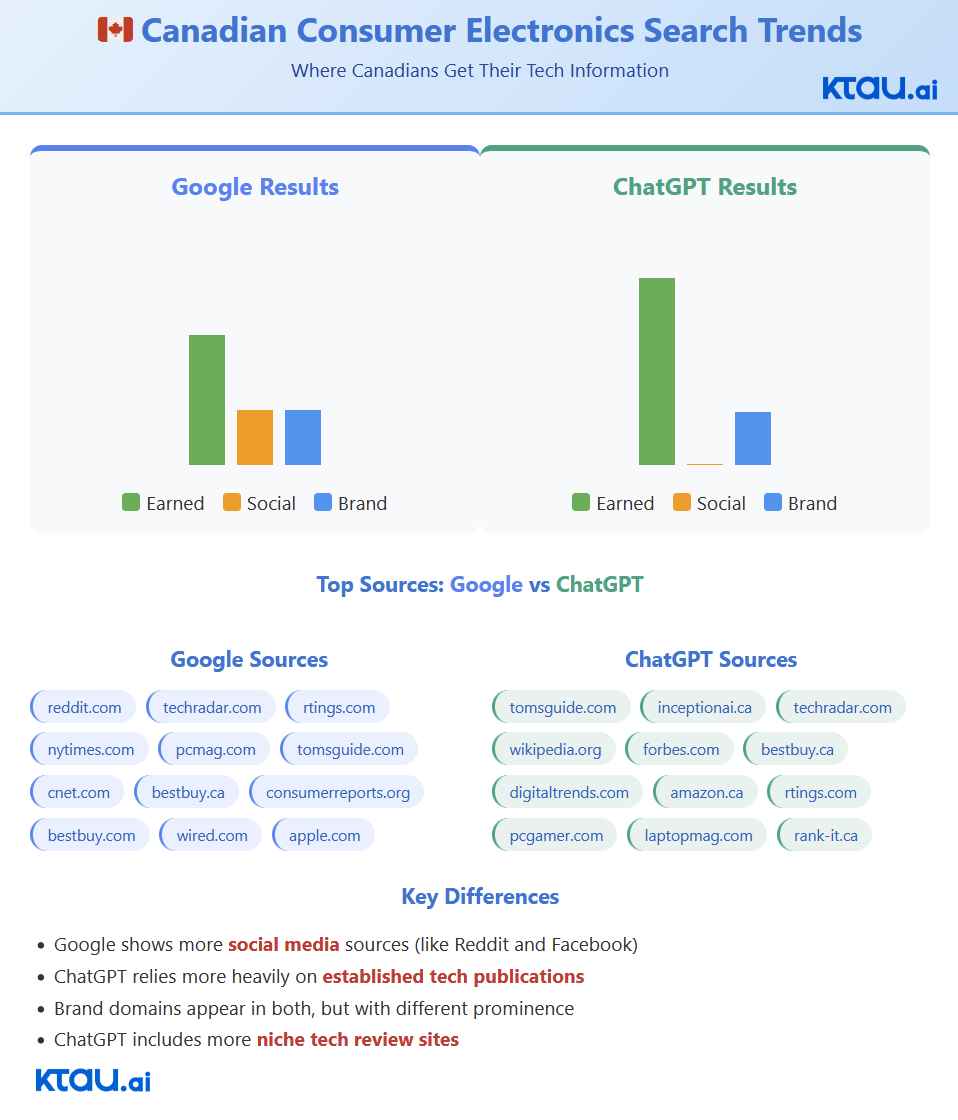.png)
Share this if you’ve ever debated Google vs. AI for tech research!

When Canadians look for the latest gadgets, tech reviews, or buying advice, where do they turn? The battle between traditional search engines and AI chatbots is reshaping how we discover information—and the results might surprise you.
We analyzed thousands of consumer electronics queries in Canada, comparing Google’s search results with ChatGPT’s responses. The findings reveal stark differences in where these platforms get their information—and what that means for shoppers, brands, and tech enthusiasts.

One of the biggest shocks? Google’s results are packed with social media. Reddit alone dominates, appearing more than any other source. Facebook and YouTube also make strong showings, proving that real-user experiences and discussions heavily influence what Google serves up.
Meanwhile, ChatGPT almost completely ignores social media (just 0.3% of its sources!). Instead, it leans on established tech publications, review sites, and—interestingly—Wikipedia.
Why it matters:

Wikipedia appears in ChatGPT’s top sources—but not at all in Google’s. This makes sense: AI models like ChatGPT are trained on vast datasets, and Wikipedia’s structured, fact-heavy format is perfect for generating answers.
But here’s the catch: Wikipedia isn’t always up-to-date on the latest tech. While great for general knowledge, it might lag behind on new product releases or cutting-edge reviews.
Why it matters:


Both Google and ChatGPT cite brand websites (like Apple, Best Buy, and Amazon), but how they do it reveals a key divide:
Why it matters:
Google’s top results are dominated by big players (CNET, TechRadar, The Verge). ChatGPT, meanwhile, includes niche sites like "SoundGuys," "Rank-It.ca," and "Digital Trends"—sources that don’t always appear in Google’s top 10.
This suggests:
Why it matters:
It depends on what you’re after.
Use Google if you…
Use ChatGPT if you…
The real winner? Smart searchers who use both.
As AI reshapes how we find information, one thing’s clear: Google and ChatGPT serve different needs. Google remains the king of real-time, crowd-powered insights, while ChatGPT acts like a well-read tech guru—skipping the noise but sometimes missing the pulse.
For now, the best strategy is to use both wisely. Check Google for the latest buzz, then ask ChatGPT for a polished breakdown. Together, they give you the full picture.
What’s your go-to for tech research? Let us know in the comments! (insert text: "comment below")
This report is created by Ktau.ai, leading Generative Engine Optimization platform. Our software platform helps brands and agencies understand user behavior as discovery shifts from traditional Google Search to AI-generated answers from ChatGPT, Perplexity and Gemini. It provides recommendations and automated optimization so you can dominate AI search. Contact us to learn more.
Ktau.ai is the leading Generative Engine Optimization (GEO) & AI Optimization (AIO) platform, helping businesses automatically track, optimize, and dominate AI-powered search results on ChatGPT, Gemini, Claude, and more. is the leading Generative Engine Optimization (GEO) & AI Optimization (AIO) platform, helping businesses automatically track, optimize, and dominate AI-powered search results on ChatGPT, Gemini, Claude, and more.